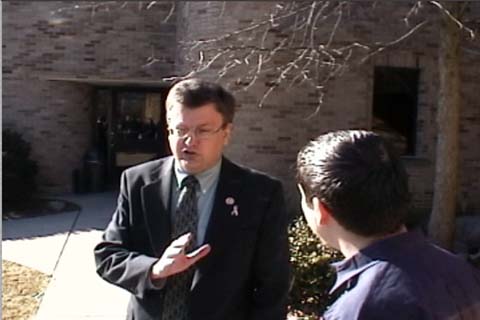Newsbrief:
Rep.
Souder
Busily
Fighting
the
"Good"
Fight
11/26/04
Indiana Republican Congressman Mark Souder just can't get enough of the war on drugs. While Souder is best known as the author of the Higher Education Act's (HEA) anti-drug provision, which bars students with drug offenses from receiving federal financial aid, and is in the midst of an effort to "fix" that law so it only applies to people in school when their busts occurred, that has not stopped him from attempting to intervene in any number of other drug war issues. Just two weeks ago, Souder was busy threatening Canada over pending legislation there that would reduce penalties for marijuana possession (https://stopthedrugwar.org/chronicle-old/362/souder.shtml). Under the Canadian proposal, people possessing less than a half-ounce of marijuana would only be fined and not stuck with a criminal record. If Canada went that route, Souder warned, it could see border slowdowns and other nastiness from the Americans. Never mind that next door in Ohio, people can possess up to a quarter-pound of pot with only a ticket.
This week, Souder and five other Republican lawmakers filed a friend of the court brief in the landmark Raich v. Ashcroft medical marijuana case urging the Supreme Court to reject states' rights arguments and uphold the use of the interstate commerce clause as a tool for federal raids on medical marijuana patients and providers in states where it is legal. The Supreme Court will hear oral arguments in that case Monday. Souder warned that a Supreme Court failure to uphold that reasoning would lead to a lessening of the federal government's ability to write and enforce national laws. "We've always had federal narcotics laws because of the Interstate Commerce Clause. This is a challenge that says states can not only change the schedule of prohibited drugs but they can override the Interstate Commerce Clause," he told the Indianapolis Star. In his brief to the court, Souder warned that even limited permission to use medical marijuana "would undermine drug regulation by giving drug traffickers a new strategy to evade arrest, creating geographic 'safe havens' for drug dealers to base their operations, increasing the risk of diversion from 'medical' use to purely recreational trafficking, increasing the supply and lowering the price of marijuana and potentially increasing the demand for the drug through reduced public perception of marijuana's harms." That same week, the conservative congressman was also focused on methamphetamines. In a November 18 interview with the Oregonian newspaper, which recently ran a series of special reports on the drug, Souder said his subcommittee is working on a comprehensive package of anti-meth legislation to be introduced in the next session of Congress. That same day, Souder's subcommittee held a hearing in Washington to examine strategies for stopping the spread of the stimulant. With meth having pushed its way East across the continent in recent years, the political will to enact tough legislation is growing, Souder said. "Now is the time we push. You've now reached a threshold. It's crossed the Mississippi," Souder said of the drug's rapid spread. "You have a majority of Congress now interested in this. Meth has not been a focus," Souder said. "Everybody's scrambling to catch up with what is happening at the ground level." Look for new, repressive legislation to emerge from Souder's committee shortly. It should be a combination of increased penalties for meth possession and manufacture and new restrictions on the chemical precursors used to make the stuff.
|

